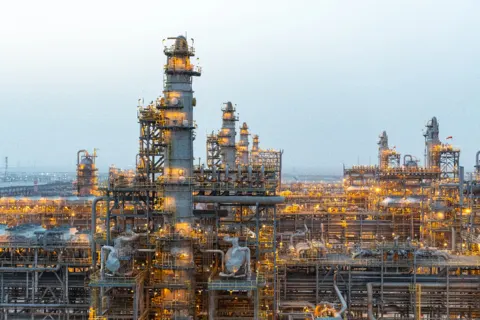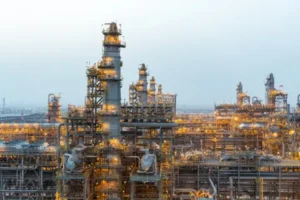
Introduction to Industrial AI in Gas Processing
Industrial automation continues to evolve with the integration of artificial intelligence (AI). Aramco and Yokogawa have recently deployed multiple autonomous control AI agents at the Fadhili Gas Plant in Saudi Arabia. This project demonstrates how control systems can achieve higher efficiency while maintaining operational safety. Moreover, it sets a benchmark for the adoption of factory automation solutions in large-scale energy facilities.

Deployment of Autonomous AI Agents
Yokogawa implemented multiple AI agents using its Factorial Kernel Dynamic Policy Programming (FKDPP) algorithm. These agents autonomously optimize acid gas removal (AGR) operations, coordinating with one another to improve overall plant performance. The deployment occurred in three phases, progressively enhancing different sections until the AI could fully control the AGR core processes.
To ensure safety, Yokogawa created a detailed plant simulator. This allowed the AI to be trained, validated, and tested before integration. Subsequently, the system was linked with Yokogawa’s CENTUM VP integrated production control system, utilizing its existing safety and control functions.
Measurable Operational Improvements
Initial results from the Fadhili Gas Plant indicate significant gains:
- 10–15% reduction in amine and steam consumption.
- Approximately 5% reduction in overall power usage.
- Enhanced process stability and reduced manual operator intervention.
These improvements demonstrate that AI-based control can maintain consistent performance despite fluctuating environmental conditions. As a result, industrial plants can achieve both energy efficiency and cost savings while minimizing operational risks.
Strategic Insights from Aramco and Yokogawa
Khalid Y. Al Qahtani, Senior Vice President of Aramco Engineering Services, emphasized the strategic value:
“Deploying industrial AI across operations enhances efficiency, sustainability, and shareholder value. Our collaboration with Yokogawa reflects our commitment to technology leadership and continuous innovation.”
Kunimasa Shigeno, CEO of Yokogawa Electric, added:
“We are proud to lead the transition from industrial automation to industrial autonomy (IA2IA). This deployment demonstrates our readiness for safe and secure autonomous operations in energy facilities.”
These statements highlight how leading companies are combining PLC, DCS, and AI technologies to establish new standards for industrial efficiency.

Industry Implications and Expert Commentary
This deployment marks a pivotal moment for industrial automation. Companies adopting AI-driven control systems can expect not only efficiency gains but also stronger compliance with environmental and safety regulations. In addition, autonomous operations reduce dependency on manual intervention, lowering the potential for human error.
From an expert perspective, integrating AI with existing DCS platforms represents a practical path forward for the energy sector. It allows facilities to leverage legacy investments while advancing toward fully autonomous factory automation.
Application Scenarios
- Gas treatment plants: Optimize chemical and energy consumption while maintaining product quality.
- Petrochemical facilities: Enhance process stability through predictive AI control.
- Industrial process upgrades: Retrofit existing PLC/DCS systems with autonomous AI agents for operational efficiency.
These scenarios illustrate the versatility and ROI potential of industrial AI in large-scale energy operations.